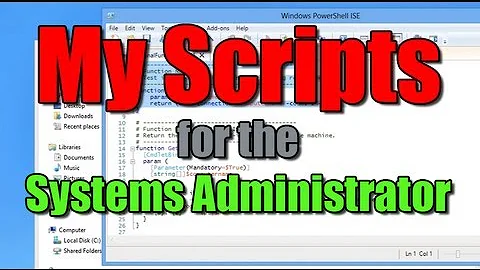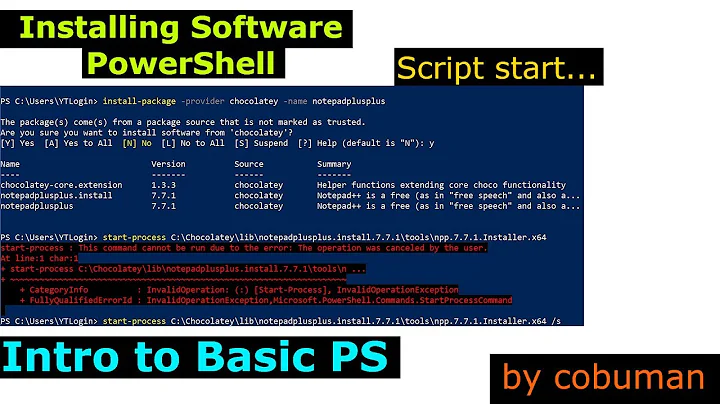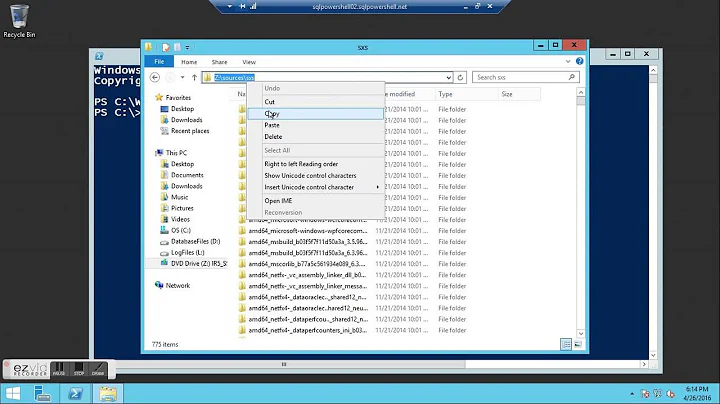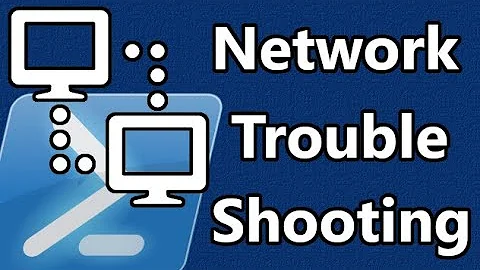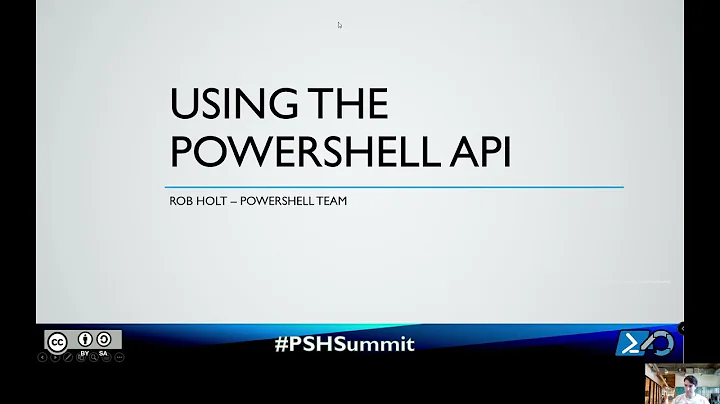Which .NET version is my PowerShell script using?
Solution 1
On PowerShell 2.0, just take a peek at the $PSVersionTable variable:
PS> $psversiontable
Name Value
---- -----
CLRVersion 2.0.50727.4927
BuildVersion 6.1.7600.16385
PSVersion 2.0
WSManStackVersion 2.0
PSCompatibleVersions {1.0, 2.0}
SerializationVersion 1.1.0.1
PSRemotingProtocolVersion 2.1
On PowerShell 1.0, use [System.Environment]::Version:
PS> [Environment]::Version
Major Minor Build Revision
----- ----- ----- --------
2 0 50727 4927
Solution 2
...no, you cannot choose which .NET version you can run the script under -- George Howarth
Woah, that's not true! You can specify which version of .NET that PowerShell uses. The key is the .NET standard application configuration file, which takes the form [appname].exe.config. You can drop that in the same directory as most .NET applications -- including the PowerShell and PowerShell ISE executables -- and the CLR will automatically load any recognizable options specified within the configuration file. One of those options is the CLR version you want the application to use.
This is documented in detail in the question: How can I run PowerShell with the .NET 4 runtime?. In particular, see Emperor XLII's post.
Solution 3
To get the .NET version:
[System.Reflection.Assembly]::GetExecutingAssembly().ImageRuntimeVersion
...which is, by default, the version of the CLR the assembly (System.Management.Automation.dll) compiled under.
And no, you cannot choose which .NET version you can run the script under.
Solution 4
The .NET version can be inferred from the version of mscorlib. So you can do the following in PowerShell to output the current version of .NET:
$a = [System.Reflection.Assembly]::Load("mscorlib")
$a.GetName().Version
Solution 5
This is an old thread, and the answer I am going to post now will not work for .NET versions from from before circa 2017.
There is a new FrameworkDescription property.
Try:
[System.Runtime.InteropServices.RuntimeInformation]::FrameworkDescription
Note, however, on some versions of Windows PowerShell (not sure about newer PowerShell 6 and 7 etc.) there are two different types System.Runtime.InteropServices.RuntimeInformation in different assemblies! And only one of them has the property. So you must qualify:
[System.Runtime.InteropServices.RuntimeInformation, Microsoft.Powershell.PSReadline]::FrameworkDescription # does not exist
[System.Runtime.InteropServices.RuntimeInformation, mscorlib]::FrameworkDescription # good
Related videos on Youtube
Comments
-
lance over 2 years
I'd like to use .NET in some PowerShell scripts I'm about to write -- how do I know/declare which version of .NET I'm dealing with when these scripts run?
And is it possible to choose against which version of .NET my script will run?
-
 Yinda Yin almost 14 yearsUp to version 3.5 of the framework, they are all backwards-compatible/inclusive with each other. So just use the subset of features that is consistent with the framework version you are targeting.
Yinda Yin almost 14 yearsUp to version 3.5 of the framework, they are all backwards-compatible/inclusive with each other. So just use the subset of features that is consistent with the framework version you are targeting. -
 Trenton McKinney over 2 yearsHey, Scripting Guy! How Do I Check Which Version of Windows PowerShell I'm Using? add from a Link-only answer.
Trenton McKinney over 2 yearsHey, Scripting Guy! How Do I Check Which Version of Windows PowerShell I'm Using? add from a Link-only answer.
-
-
 George Howarth almost 14 yearsYou don't have to load mscorlib since it's already loaded into the application domain by default:
George Howarth almost 14 yearsYou don't have to load mscorlib since it's already loaded into the application domain by default:([AppDomain]::CurrentDomain.GetAssemblies() | ? { $_.GetName().Name -eq "mscorlib" }).GetName().Version -
 x0n almost 14 yearspowershell.exe is hard-coded to load v2.0 of the CLR, always. This counts for both v1 and v2.
x0n almost 14 yearspowershell.exe is hard-coded to load v2.0 of the CLR, always. This counts for both v1 and v2. -
 x0n almost 14 yearsand the cleanest way for version in powershell is probably: [environment]::Version
x0n almost 14 yearsand the cleanest way for version in powershell is probably: [environment]::Version -
 x0n almost 14 yearseasier to just use: [environment]::Version
x0n almost 14 yearseasier to just use: [environment]::Version -
Lee Campbell over 11 yearsGeorge_Howarth, this is not true. As jmh_gr points out below you can override the version of .NET that is used (so it is NOT hard coded). I needed to check the version of a .NET4 assembly in PS1, to do this I applied the tip jmh_gr posted below (.NET 1 failed reading the newer assembly type). Running "[System.Reflection.Assembly]::GetExecutingAssembly().ImageRuntimeVersion" returns v2.0.50727, however running "[Environment]::Version" returns me the more accurate 4.0.30319.296.
-
yoel halb almost 10 years@x0n [enviroment]::version returnts the CLR version but mscorlib.GetName().Version returns the .net framework in use
-
 David Klempfner over 9 yearswhich one is the .NET version? Is it the CLRVersion?
David Klempfner over 9 yearswhich one is the .NET version? Is it the CLRVersion? -
Keith Hill over 9 years@Backwards_Dave Yes, CLRVersion indicates the version of the common language runtime. You can correlate that version number to the .NET Framework version in use - this SO answer stackoverflow.com/questions/212896/…
-
erroric over 9 yearsInstead of Emperor XLII, try Jeppe Stig Nielsen's answer stackoverflow.com/a/27188121.
-
TNT over 4 yearsIn Powershell core/ PS 7 the old way in this answer (
[Environment]::Version) is the only working way to get the CLR-version (of the both mentioned here). -
Jeppe Stig Nielsen about 2 yearsIf you want
GetName().Versionon mscorlib, you can also use[Object].Assembly.GetName().Version. In fact, in much newer PowerShell versions (not existing when the other comments were made, so they could not have known) it will go through assembly System.Private.CoreLib instead, which is what you want in that case.

